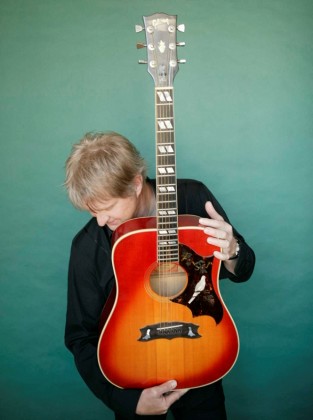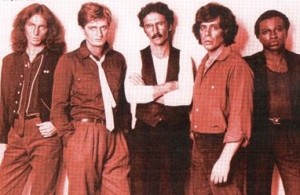INTERVIEW: Tom Cochrane hit a crossroads on highway of life
 Rock musicians do not get much sympathy for complaining how hard it is to be a rock musician.
Rock musicians do not get much sympathy for complaining how hard it is to be a rock musician.
Nonetheless, some do whine from time to time. Because it is hard. Even Tom Cochrane found it hard back in the day. Not so much anymore. Playing the sold out Chamber Ball 2012 Friday at the Shaw Conference Centre with Red Rider and the Edmonton Symphony Orchestra, Cochrane has been comfortably riding Life is a Highway for quite some time. So will his grandchildren.
Long before that ubiquitous little hit and all its cover spawnlings came along, Cochrane and the other members of Red Rider were struggling rock musicians – complaining about same to the point they even considered packing it in. In a recent phone interview, Cochrane recalls a moment in September of 1980 that changed his tune.
“Being on the road as a musician is not all it’s cracked up to be,” Cochrane says, prefacing his comment with a disclaimer that no one wants to hear a rock musician complain about their job. Even so, “When we’re in the garage as kids we have all these majestic dreams of what it’s going to be like. The reality is that you’re out on the road, scrambling around for money to eat, you’re all piled into one car and you can only afford to sleep in a hotel once every two nights and not a great hotel at that.
 “I remember a particularly gruelling drive from Winnipeg back to Toronto, and it was a cold, wet morning. I was leaning against the glass and had fallen asleep, but woke up wondering why we were in a traffic jam outside of Thunder Bay. I thought to myself, I don’t want to do this much longer. I can’t deal with this. This isn’t a whole lot of fun. So I look out through the window, through the rain and there’s a couple of police cars and I saw this guy with an ashen face, water running down his face, clear as day right next to the car. He had one leg and he was running up a hill.”
“I remember a particularly gruelling drive from Winnipeg back to Toronto, and it was a cold, wet morning. I was leaning against the glass and had fallen asleep, but woke up wondering why we were in a traffic jam outside of Thunder Bay. I thought to myself, I don’t want to do this much longer. I can’t deal with this. This isn’t a whole lot of fun. So I look out through the window, through the rain and there’s a couple of police cars and I saw this guy with an ashen face, water running down his face, clear as day right next to the car. He had one leg and he was running up a hill.”
It was Terry Fox, of course. The members Red Rider were lucky enough to catch a glimpse of the late Canadian hero on the very last day he ran on his cross-Canada trek for cancer awareness. He died less than a year later.
“That was an epiphany for me,” Cochrane goes on. “I definitely gave up ideas of packing it in. How tough is this? I’m making people happy at nights and playing music, and if there’s a little bit of discomfort involved, big deal. Look what this guy is going through.”
It was around this time that a young Tom had a chat with his dad. He even recalls the conversation:
“Dad, do you think I’m doing the right thing?”
Dad: “No, I think you’re nuts.”
Mr. Cochrane adds, “But it doesn’t matter what I think. They thought I was crazy when I came out of World War 2 and thought I could make a living as a pilot. I had a job all set up in Winnipeg with Burns Meat, but I said, no, I’m gonna be a pilot and they said ‘you’re nuts’ – same as I’m telling you. But guess what? I gave it 150 per cent and I couldn’t be happier because I made a living doing what I love to do … if you can do that you’re a lucky man.”
It would wrap the story up neatly to say that Cochrane went straight home to write Life is a Highway and the rest was history, but Lunatic Fringe – a modest rock hit on the U.S. – was still a year away, while Cochrane’s solo smash Life is a Highway wouldn’t come out for another decade. After it did – spawning at least two successful cover versions and providing what Cochrane calls “an exceptionally wonderful existence” for his family – there were other challenges. While before people would call Cochrane the CanCon poster boy and declare he would have never gotten anywhere without Canadian nepotism and the CRTC, “Highway put that to rest,” he says. Shortly thereafter he’s playing an outdoor rock festival in Gimli, Manitoba, near his birthplace, when the lead singer of one of the bands walks up to him backstage and says, “Why don’t you go back to the States? They like you down there.”
Cochrane says, “He said it to my face and then walked away. That little bastard. It was a band called Zen Bungalow. I don’t know where they ended up. If he realized what I went through and my dedication to this country and how much I love this country … well, what do you say to that? You can’t win.”
Cochrane’s been in a “poignant” mood lately, as he’s grieving over the recent deaths of his friend and famed photographer Andrew MacNaughtan, and also Cochrane’s cousin Dr. Craig Bennett, who was a leading breast cancer researcher at Duke University in North Carolina. Suffering from rheumatoid arthritis for a good deal of his life, Bennett never complained, either.
Says Cochrane, “It makes me a bit more appreciative of how lucky I am, all these things we take for granted.”











